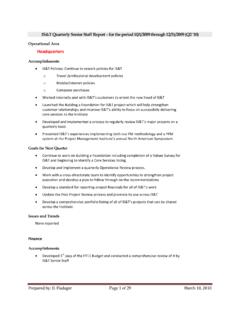Transcription of The principles of good data management - GOV.UK
1 Intra-governmental Groupon Geographic InformationThe principles of GoodData ManagementThe principles of GoodData Management2nd EditionJuly 2005 Office of the Deputy Prime Minister: London The Office of the Deputy Prime MinisterEland HouseBressenden PlaceLondon SW1E 5 DUTelephone 020 7944 4400 Web site Queen s Printer and Controller of Her Majesty s Stationery Office 2005 Copyright in the typographical arrangement and design rests with the publication (excluding logos) may be reproduced free of charge in any formator medium provided that it is reproduced accurately and not used in a misleadingcontext.
2 The material must be acknowledged as Crown copyright with the title andsource of the publication publication is also available at enquiries relating to this publication should be addressed by email copies of this publication are available from:ODPM PublicationsPO Box 236 WetherbyWest YorkshireLS23 7 NBTel: 0870 1226 236 Fax: 0870 1226 237 Textphone: 0870 1207 405E-mail: in Great Britain on material comprising 80% post-consumer waste and20% ECF 2005 Product Code: 05 PLUS 03146 AcknowledgementsThis guide, version , dated June 2005, was prepared by the IGGI Working Groupon data management and Standards.
3 Thanks to Jeremy Giles, British GeologicalSurvey and his cross-departmental team for their considerable efforts in puttingtogether this guide. Thanks also to David Lowe, British Geological Survey, forediting the Philip White, IGGI ChairmanThe Good data management booklet was originally produced 2002as part of IGGI s commitment to encourage best practice whendealing with government geographic information. Recognising thatthe environment is constantly evolving, the guide has been revised totake account of current best practice, recent developments and reflectkey legislation.
4 In recent years, there has been an increased emphasison facilitating data sharing both within and between principle of collect once, use many times is well establishedas a concept but can only be achieved with data management . Thisbooklet complements The principles of Metadata management alsopublished by booklet provides best practice guidance for those responsible formanaging data of a geographic nature. Specifically, it considers thebenefits, drivers, principles and mechanisms needed for good guide helps ensure that processes are in place for initial inputand maintenance of reliable metadata for retrieval through ODPM sMaps on Tap and the gigateway data Locator.
5 If the metadatapolicies recommended in this leaflet are followed, users can expectconsistency in the data they are using and exchanging with theircolleagues throughout central would like to thank the members of the group chaired by JeremyGiles from British Geological Survey for their hard work and thecommitment involved in completing this principles of Good data Management1 The principles of Good data Management2 The principles of Good data Management3 CONTENTS1 Purpose of this guide62 What is data management ?73 Why do we need to manage our data ?8 Key drivers for improved data Management84 Benefits of good data Management10 Benefits to data Suppliers10 Benefits to data Brokers/Intermediaries10 Benefits to users and customers115 principles of Good data Management12 Avoid re-collecting data12 data lifecycle control12 data policy13 data ownership13 Metadata14 data quality146 Establishing a data Policy17 data acquisition17 data care Stewardship17 data use and exchange17 Review187 Implementation key roles19 data management Champion19 data Manager19 data Stewards198 Further guidance219 Glossary of Terms2210 World
6 Wide Web URLs24 The principles of Good data Management41 Purpose of this guideThis guide provides general guidance on the management of guide has been produced for those responsible for geographicinformation, although the principles are equally relevant to othertypes of government departments and agencies collect, generate, store anduse large amounts of data that have been obtained at considerablecost. Much of this data is geographical in that they are referenced togeographical locations, such as points, lines or areas; post importance of good data management has become increasinglyrecognized over recent years and a body of legislation reflects thischange in attitude.
7 Key elements of the relevant legislation include: The Freedom of Information Act 20001 The Environmental Information Regulations2 The Human Rights Act 19983 The data Protection Act 19984 The Public Records Act 19585 The European Commission is also having greater impact, asINSPIRE and the Directive on Public Sector Informationdemonstrate. These and other drivers mean that data management ,and the associated activity of records management , need to be givenpriority by public principles of Good data Management52 What is data management ? data management is a group of activities relating to the planning,development, implementation and administration of systems for the acquisition, storage, security,retrieval, dissemination, archiving and disposal of data .
8 Such systemsare commonly digital, but the term equally applies to paper-basedsystems where the term records management is commonly used. Theterm embraces all forms of data , whether these datasets are simplepaper forms, the contents of relational databases, multi-mediadatasets such as images, or scientific data such as seismic records ofthe UK land management of geographic data is in many ways no different tothe management of other types of data . However, it is important torecognise that there may be geography-specific issues that needcareful thought as part of data management activities; for example,ensuring that any geographic identifiers used are appropriate andresilient.
9 Bearing in mind that one of the strengths of geographicdata is the ability to link seemingly disparate pieces of information,it is absolutely critical to ensure that the chosen geographicidentifiers allow data management activities include: data Policy development; data Ownership; Metadata Compilation; data Lifecycle Control; data Quality; and data Access and principles of Good data Management6 This guide covers only the key aspects of data additional advice is now available from The NationalArchives6, The Department for Constitutional principles of Good data Management73 Why do we need to manageour data ?
10 Government owns huge amounts of irreplaceable GeographicInformation, potentially of use to a wide range of bodies, and thereare increasing pressures on departments/agencies to manage thesedata properly. Examples of these pressures are identified drivers for improved data ManagementThe Freedom of Information (FoI) Act 2000 came into force inJanuary 2005. General guidance on FoI is provided by TheDepartment for Constitutional Affairs9and The National Archives(TNA)10. The FoI defines clear duties and responsibilities for all whomanage public sector information in all its forms.











